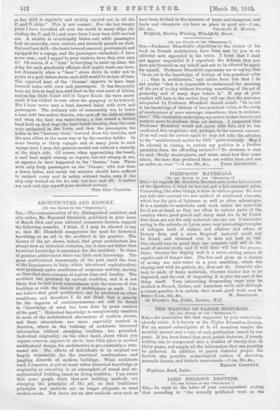[To TWE EDITOR OF TRU "SPECTATOR."
Ssa,—Professor Blomfield's objections to the review of his book on French architecture have been met by you in an editorial note appended to his letter. I trust that I shall not appear ungrateful if I repudiate the defence that you have put forward on my behalf and ask to be allowed to speak for myself. Professor Blomfield represents me as saying that "in no art is the knowledge of history of less practical value . . . than in architecture," and infers from this that I do not realize "that it is impossible to understand the meaning of the art of to-day without knowing something of the art of yesterday and of many days before it." If any of your readers will turn to the review they will see that the sentence misquoted by Professor Blomfield should stand : "In no art is the knowledge of history of less practical value, or the study of mastetylieces of more sovereign importance, than in architec- ture." The contention underlying my review is that historic art matters more to students than art history. I suspected that Professor Blomfield would not agree with this, and be has confirmed this suspicion—not, perhaps, in the suavest manner. If he will read the review again he may not take the allusion to the "architectural modes for 1912" quite seriously. May I be allowed in closing to restate my position in a further quotation from the offending review P—" To students it may be said, Study masterpieces, and never mind how they came about; the laws that produced them are within them and are as active as ever.' "—I am, Sir, &c., Yam:. REVIEWER.






































 Previous page
Previous page